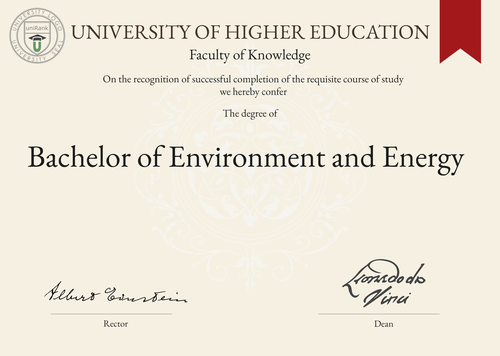
Bachelor of Environment and Energy (B.Env.E.)
Guide to Bachelor of Environment and Energy Program/Course/Degree
Bachelor of Environment and Energy (B.Env.E.)

Program Name:
Bachelor of Environment and EnergyProgram or Degree abbreviation:
B.Env.E.Duration range:
The duration of the program typically ranges from 3 to 4 years.Tuition range:
The tuition fees for the program can vary depending on the country and university chosen. It is recommended to check with specific institutions for accurate information.Overview:
The Bachelor of Environment and Energy program is designed to provide students with a comprehensive understanding of environmental issues and sustainable energy solutions. It combines knowledge from various disciplines such as environmental science, renewable energy and policy development.Curriculum Overview by year:
- Year 1: Introduction to Environmental Studies, Energy Fundamentals, Mathematics for Environmental Sciences, Introduction to Sustainability - Year 2: Environmental Policy and Law, Renewable Energy Technologies, Environmental Impact Assessment, Climate Change and Adaptation - Year 3: Sustainable Resource Management, Energy Economics, Environmental Monitoring and Assessment, Environmental Ethics - Year 4: Advanced Energy Systems, Environmental Planning and Management, Environmental Policy Analysis, Research ProjectKey Components:
The key components of the program include studying environmental science, renewable energy technologies, policy development, sustainable resource management and conducting a research project.Career Prospects:
Graduates of the Bachelor of Environment and Energy program can pursue various career paths. They may work in environmental consulting firms, government agencies, renewable energy companies, research institutions, or non-profit organizations. Possible job roles include environmental analyst, energy consultant, sustainability coordinator, policy advisor, or research scientist.Salary Expectations:
Salary expectations for graduates of the program can vary depending on factors such as location, industry and job position. It is advisable to research specific salary ranges in the chosen country and field of work. For a more accurate understanding of salary expectations, you can utilize the Job Sites Search Engine, from our sister site jobRank, which searches over 4,600 job sites worldwide. Make sure to specify not only the job title but also the country you are interested in.Conclusions:
It is important to note that the duration, tuition fees, curriculum, key components, career prospects and salary expectations of the Bachelor of Environment and Energy program can vary. These variations can be influenced by the country or location where the program is studied, as well as the university chosen. Visitors interested in pursuing this degree are encouraged to use the uniRank World Universities Search Engine to find institutions offering the Bachelor of Environment and Energy program worldwide.World Universities Search Engine
search for Bachelor of Environment and Energy (B.Env.E.) and add the Location (country, state etc.) or specific University you are interested in studying at.
Query examples:
- Bachelor of Environment and Energy (B.Env.E.) United States
- Bachelor of Environment and Energy (B.Env.E.) United Kingdom online
- Bachelor of Environment and Energy (B.Env.E.) Australia international students
- Bachelor of Environment and Energy (B.Env.E.) University of California
- Bachelor of Environment and Energy (B.Env.E.) University of London tuition fees
- Bachelor of Environment and Energy (B.Env.E.) University of Sydney scholarships
Share Program/Course
Interesting? Share this program/course/degree info with your friends now.